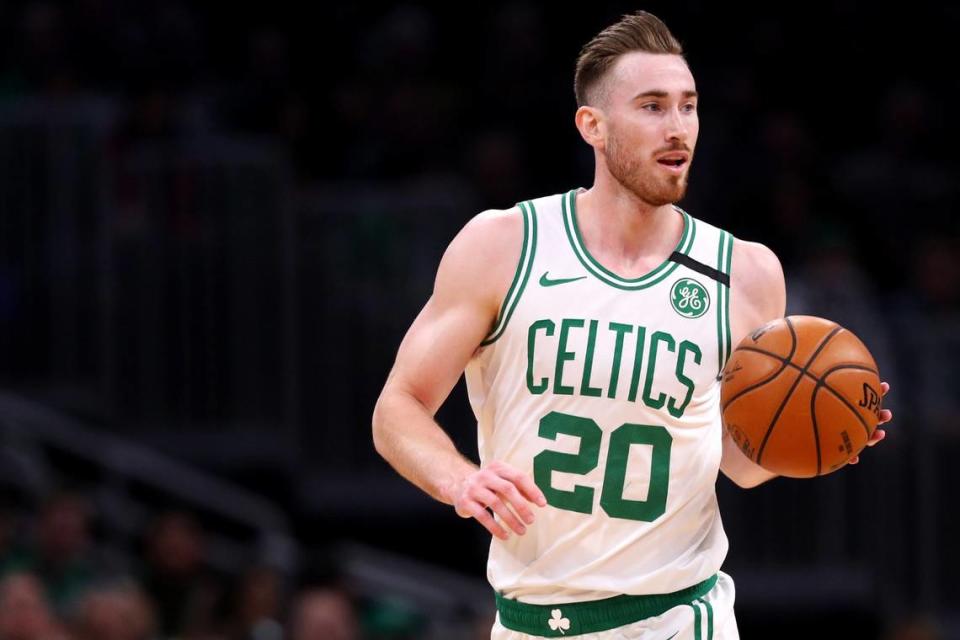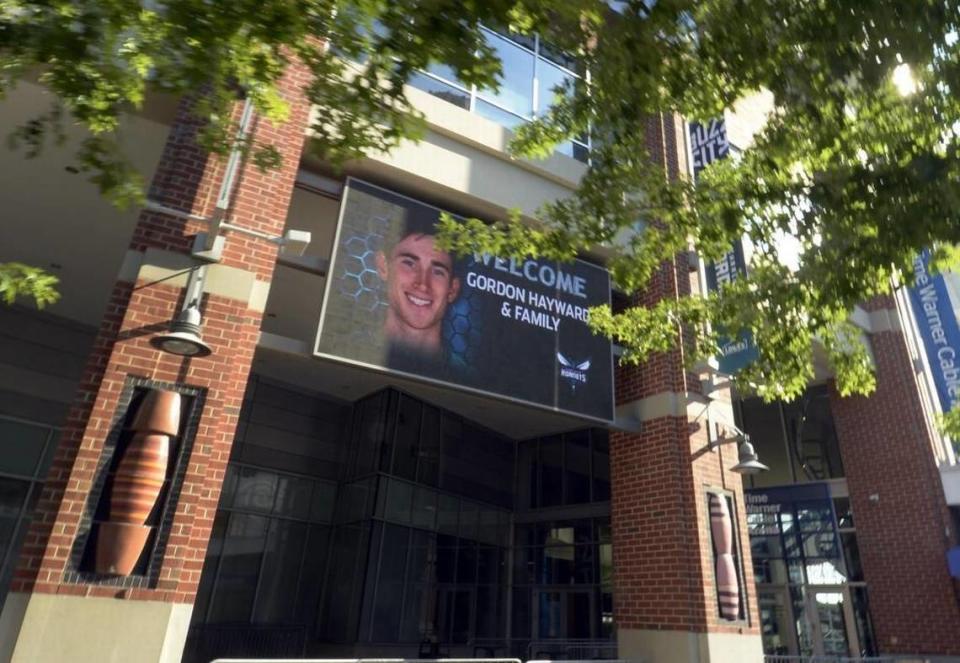The Hornets paid too much for Gordon Hayward, but that’s better than the alternative
- Oops!Something went wrong.Please try again later.
At first glance, it looks like the Charlotte Hornets overpaid to get Gordon Hayward.
At second and third glance, it still looks that way. Spending $120 million over four years for a 10-year NBA veteran who’s on the wrong side of 30 and has had some serious injury problems — that’s not anyone’s version of buying low and selling high.
It would be easy to lambast the Hornets for getting rid of one horrible contract by waiving Nic Batum only to tangle themselves up in another one.
And yet ...
I like the boldness of this. I like Hayward as a player and always have, ever since he starred for Butler and was a rimmed-out, half-court heave away from upsetting Duke in the 2010 NCAA final. This may not work out — and at best it’s 50-50 that it will — but I don’t mind the risk.
“I still view myself in the prime of my career,” Hayward said Tuesday.
You may greet that with an exaggerated eye roll. You may have the same reaction about what Hornets general manager Mitch Kupchak said of the risk involved in giving a 10-year vet in Hayward, who has only made one All-Star team in a decade, a guaranteed $120 million.
“He’s 30 years old,” Kupchak said of Hayward Tuesday. “It might not be a fair comparison, but I think Jimmy Butler was 31 when Miami brought him on board.”
Butler was actually 29, and already a four-time all-star, when he signed with the Heat in the summer of 2019. He was 30 when the 2019-20 season began, however, just like Hayward. He ended up leading Miami to the NBA Finals, as the Heat bested Hayward’s Boston team in the Eastern Conference finals.
“I think Jimmy had a pretty good year,” Kupchak continued. “I think the best years for an NBA player, when their mind catches up to their body, are between the ages of 28-32. So I think he (Hayward) still has at least two, maybe three, solid years where he can play at a high level.”
With Gordon Hayward, Hornets finally ‘do something’
We are always criticizing the Hornets by saying, “Do something!”
Get off the hamster wheel of mediocrity. Get better or get worse to get better, but quit being so darn average.
This is “doing something,” and in a big way. So was picking LaMelo Ball at No. 3 overall in the 2020 NBA draft; that wasn’t a move I agreed with but, again, it certainly checks the boldness box. Too bad the Hornets can’t have fans in the immediate future at home games due to COVID-19. At the very least, this team will be either entertainingly good or entertainingly bad.
The Hornets paid Hayward a king’s ransom and used up a lot of their salary-cap room to do something this time. But if they had held onto that cap room, would they really have gotten a better free agent than Hayward in the summer of 2021, when far more teams will have far more room under the cap? Or would it have been like a basketball coach who goes home with two timeouts still in his pocket, but also with yet another loss to stew over?

When you’re a small-market team, by and large you have two chances at a marquee free agent: Slim and none. Charlotte is never going to sign LeBron or Giannis or Durant or Steph, at least not anywhere near their prime. Doesn’t matter if you have Michael Jordan as an owner, it turns out — the Hornets have found out the hard way that those guys still aren’t coming here. No one wants to construct a “super-team” in Charlotte except LaVar Ball, and the problem with his would be that you have to be related to him to be on it.
But the Hornets had real history with Hayward, who had always appreciated that 2014 offer and was ready to come to Charlotte then if Utah hadn’t matched. And they also felt like Hayward’s skill set fit them well. So they overpaid him, because that’s what a team like Charlotte has to do to get into the free-agent pool at the deep end.
“Do we need him to average 25 or 27 points for this team?” Kupchak asked. “No, we don’t need that. We need the stability in the locker room. We need what he brings to us at that position, not only scoring but facilitating an offense. What does that translate into? I don’t know — 17-19 points, six rebounds?”
Said Hornets coach James Borrego of Hayward: “He (is) a playmaker, and this is where the NBA is at today. ... Big playmakers that can see over the defense and create for himself and for others. ... Gordon is all of 6-8. He plays big. He can play at the rim. He plays mid-range. ... He’s a two-way player who plays both ends of the floor. Those are all things that fit our roster.”

The Hornets and Jordan have coveted Hayward for six years, signing him to a lucrative contract in 2014 as a restricted free agent, only to have Utah match it. Hayward said Jordan told him recently via text message that “he’s wanted me for years now.”
Michael Jordan can afford this risk
So let’s think of the worst-case scenario. What if Hayward gets badly hurt again, or just can’t play above the rim anymore and get fouled (and his free-throw attempts have been cut in half since his gruesome leg injury in 2017, in the very first quarter of his very first game as a Boston Celtic). What if the Hornets, by acquiring him, only get worse?
That’s not ideal, but it also gives the Hornets a better chance at another big-time lottery pick.
When it comes down to it, everyone in the NBA is overpaid. Now Haywood is vastly overpaid. But so what? Jordan can afford it. The Hornets had the cap room and they will continue to have some.
Maybe the reward will come in the next 2-3 seasons, and maybe it won’t. But for a team like Charlotte, stuck in the mud for so long, Hayward was a risk worth taking.

